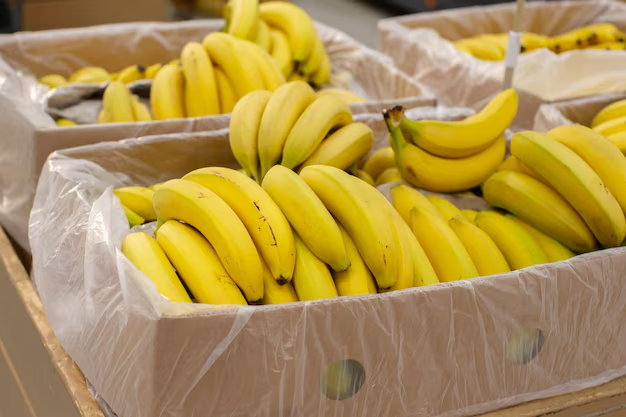Should You Store Bananas in the Refrigerator? Unraveling the Mystery of Banana Storage
Bananas are more than just a popular snack; they're a staple in many households around the globe. But have you ever wondered if storing them in the refrigerator is a good idea? This might seem like a straightforward question, but there’s a bit more beneath the surface that merits exploration for those interested in maximizing fruit freshness and understanding proper food storage.
🥶 Are Bananas Fridge-Friendly? Understanding Banana Composition
Let’s start by understanding the composition of bananas. Bananas are tropical fruits that originated in Southeast Asia, and they thrive in warm temperatures. Their structure is adapted for humidity and warmth; hence, the standard room temperature storage. So, does the refrigerator preserve them better?
Chemical Reactions and Ripening
Bananas ripen through a process involving the emission of ethylene gas, a plant hormone. When stored in the fridge, this process can be disrupted. The cold temperatures can cause chilling injury to the banana’s cells, making the peel turn brown while the inside remains fairly unaffected for a while. However, if left too long, the interior quality can degrade as well.
🚦 The Right Time to Refrigerate Bananas
While the initial reaction is to avoid refrigerating bananas, there is a specific point at which refrigeration may be beneficial.
Once Ripe, Keep Cool
- When bananas reach optimal ripeness, refrigeration can actually slow further ripening. If you've ever purchased a bunch that all ripened at once, you’ll know that it can be tough to eat them all before they overripen. Place ripe bananas in the refrigerator to extend their life for a few more days.
🍌 Practical Banana Storage Tips for Freshness
Here are some practical insights into storing bananas for maximum shelf life and freshness:
- Unripe Bananas: Store at room temperature until they ripen.
- Ripe Bananas: Once fully yellow with minimal brown spots, move to the fridge.
- Overripe Bananas: Use them in recipes such as smoothies or banana bread, or freeze for later use.
🌱 Storing Bananas with Other Fruits
Bananas emit ethylene gas, which can affect other fruits nearby. When bananas are stored near other fruits:
- Separation is best, especially for fruits sensitive to ethylene, such as apples and avocados.
- Using a banana hanger can help improve airflow around the fruit, delaying the ripening process without refrigeration.
🙌 Recap and Key Takeaways
Here’s a summary of the most important tips 📝 for storing bananas:
- Room Temperature 🍌: Best for unripe to moderately ripe bananas.
- Refrigeration 🥶: Useful for slowing the ripening of fully ripe bananas.
- Avoid Refrigerating Green Bananas ⚠️: It can affect their taste and texture.
- Freezing 🍨: Great for overripe bananas.
🥑 Expanding Your Storage Know-How
This exploration into bananas can spark curiosity about how to store other foods. Storing fruits and vegetables properly not only extends their life but can also reduce food waste significantly.
Explore More on Storing Other Fruits & Vegetables:
- Citrus fruits: Store in a cool, dark place but avoid refrigeration until cut.
- Leafy greens: Best kept in the crisper drawer of your fridge.
🍞 Hybrid Storage: More than Just Bananas
You've probably asked, “Are bananas the only fruit affected by the fridge?” The answer is a resounding no. Many fruits and vegetables respond differently to refrigeration.
Banana's Conundrum with Other Hybrid Options
- Avocados: Similar to bananas, avocados should ripen at room temperature before refrigeration to maintain texture and taste.
- Tomatoes: Refrigeration can impact flavor and texture, much like bananas.
🥧 Recipes: Maximizing Bananas Beyond Snacking
An overflow of bananas calls for creativity. When bananas get too ripe, there's an opportunity for delicious creations.
Delicious Banana-Infused Ideas:
- Banana Bread: A classic, fragrant bread using overripe bananas.
- Smoothies: A delicious, nutritious use for bananas that have been refrigerated.
- Banana Oat Cookies: A healthy, quick-bake option perfect for a snack.
🧠 Insights into Banana Storage Innovations
With an increasing focus on sustainability, new technologies are being developed to help extend the life of produce. Watch for innovations that may reshape how we store fruits like bananas in the future.
Emerging Trends in Produce Technology:
- Ethylene absorbers: Designed to absorb the gases that speed up ripening.
- Revolutionary packaging: Packaging that adjusts to keep produce fresher longer without refrigeration.
🤔 The Bigger Picture: Food Storage and Sustainability
Finally, it’s essential to consider how proper food storage impacts not only our homes but the planet. Reducing waste by understanding fruit storage extends beyond cost-saving and involves an effort to reduce environmental footprints.
Final Thoughts on Banana Storage: Remember, while bananas may seem trivial in the grand scheme of things, every small habit contributes to a larger change. Understanding the nuances of food storage can help in making more conscious, sustainable choices in our daily lives.
Bananas can certainly be stored in the refrigerator once ripe to extend freshness, but understanding when and how to use refrigeration is key to maintaining their quality and minimizing waste. Through small yet impactful actions like these, we contribute to a more sustainable world. 🍌🥦

